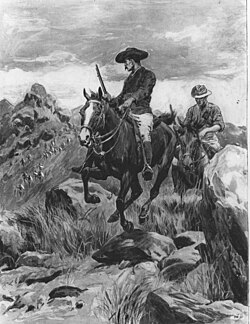Our website is made possible by displaying online advertisements to our visitors.
Please consider supporting us by disabling your ad blocker.
Second Matabele War
| Second Matabele War | |||||||
|---|---|---|---|---|---|---|---|
| Part of the Matabele Wars | |||||||
 Depiction of Burnham and Armstrong after the assassination of Mlimo. Matabele warriors in hot pursuit, drawn by Frank Dadd. | |||||||
| |||||||
| Belligerents | |||||||
|
|
Matabele Shona | ||||||
| Commanders and leaders | |||||||
|
Robert Baden-Powell Frederick Carrington Cecil Rhodes Herbert Plumer |
Mlimo † Sikhombo Mguni Inyanda | ||||||
| Casualties and losses | |||||||
| ~400[citation needed] | ~50,000[citation needed] | ||||||
The Second Matabele War, also known as the First Chimurenga, was fought in 1896 and 1897 in the region later known as Southern Rhodesia, now modern-day Zimbabwe. It pitted the British South Africa Company against the Matabele people, which led to conflict with the Shona people in the rest of Southern Rhodesia.
In March 1896, the Matabele revolted against the authority of the British South Africa Company. The Mlimo (or M'limo, or Umlimo) the Matabele spiritual leader, was credited with fomenting much of the anger that led to this confrontation. He convinced the Matabele and the Shona that the settlers (almost 4,000-strong by then) were responsible for the drought, locust plagues and the cattle disease rinderpest ravaging the country at the time.
The Mlimo's call to battle was well-timed. Only a few months earlier, the British South Africa Company's Administrator General for Matabeleland, Leander Starr Jameson, had sent most of his troops and armaments to fight the Transvaal Republic in the ill-fated Jameson Raid. This left the country nearly defenceless. The British immediately sent troops to suppress the Matabele and the Shona, but it cost the lives of many on both sides. Months passed before the British forces were strong enough to break the sieges and defend the major settlements, and war raged on until October of the following year.
Previous Page Next Page


